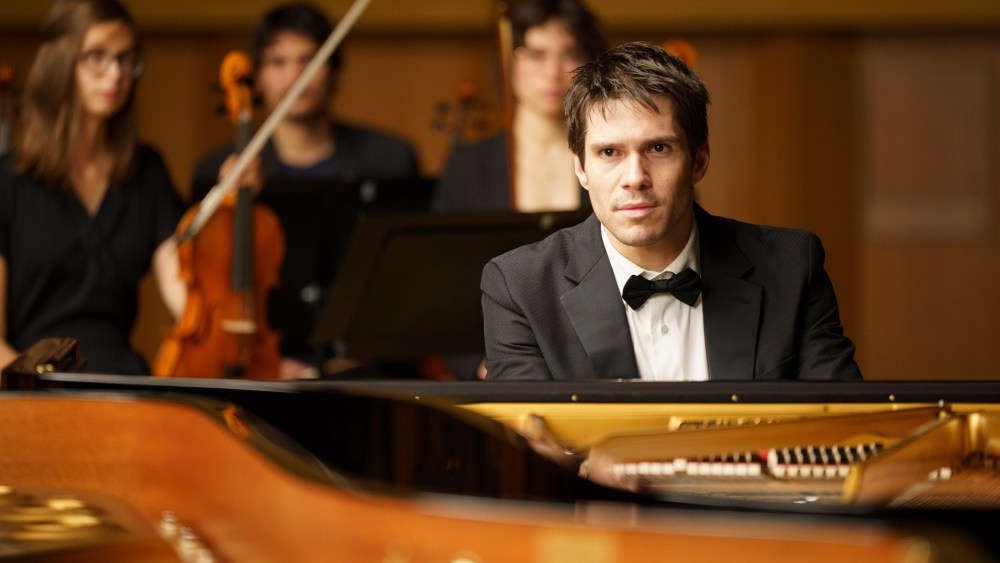Minutes into “Two Pianos,” two former lovers unexpectedly run into each other in the narrow lobby of an venerable Lyon apartment building, after several years of estrangement. In the real world, this would be a cue for some halting, awkward small talk, perhaps, or a passive-aggressive nod of acknowledgement, or just a simple cold shoulder. The world of French auteur Arnaud Desplechin, however, is rather more heated than that: The man promptly faints, banging his head on the elevator door on his way down, while the woman frantically flees, as if from a crime scene. The melodrama begins at such a high pitch in Desplechin’s latest, you might think it has nowhere to go but down, yet this earnestly inflamed tale of art, grief, betrayal and all-consuming amour on steroids keeps finding new, hysterical ways to surprise.
High emotions and heightened storytelling have long been fixtures of Desplechin’s filmmaking, not least in the peak-form days of “Kings and Queen” (2004) and “A Christmas Tale” (2008), though he’s lately ramped it up several notches: His last fiction feature, the incest-laced sibling-rivalry drama “Brother and Sister,” was shrill and overwrought from the jump, to swiftly off-putting effect. “Two Pianos” is very nearly as ripely played and ludicrously plotted as its predecessor, though it invites its audience a little more into its theatrics — and has a marvelous cooling factor in Charlotte Rampling, at her most briskly imperious, to counter the emotional chaos drummed up by the film’s younger characters. The result will likely net wider international arthouse exposure than Desplechin’s last few efforts.
Fresh off a César nomination for exploring equally torrid territory in last year’s “Beating Hearts” — though here he plays rather more bourgeois — François Civil stars as Mathias, a gifted concert pianist who has spent the last few years teaching in Tokyo, where he appears to have both rested his prodigious talents and closed his heart to romantic possibilities. Now returning to his hometown of Lyon, he’s commissioned by his former mentor Elena (Rampling), herself a celebrated piano virtuoso, to duet with her in a series of concerts that she intends to be her last.
One look at Elena’s fierce demeanor and knife-mouthed expression and it’s clear Mathias never had the option of refusing, even if he’s hesitant for several reasons to return home and to the spotlight: Rampling plays her with the kind of ruler-backed stance and no-syllable-wasted terseness that projects absolute assurance in herself while demolishing it in others. Yet there’s more vulnerability behind that searingly direct gaze than she cares to let on, and her growing awareness of her mortality makes her especially aggravated that her onetime star discovery has, in her view, been wasting his best years. “Two Pianos” is most affecting when centered on the testy nuances of this still tightly bound teacher-pupil relationship.
But there’s a whole lot else going on here besides, beginning with that aforementioned lobby encounter between Mathias and blonde mystery woman Claude (Nadia Tereszkiewicz, more breathily reminiscent than ever of a younger Marion Cotillard). The plotting in Desplechin and Kamen Velkovsky’s script is perhaps more staggered than it needs to be, though we gradually pick up that Claude is an old flame, now married to Mathias’ former best friend Pierre (Jeremy Lewin).
No sooner have we processed that information than a sudden, breakneck narrative swerve places Claude back on the market romantically, and in this particular school of sped-up melodrama, she has no intention of wearing her widow’s weeds longer than a day or two. And that’s before the already frazzled Mathias chances upon a young boy in the park who’s an eerie döppelganger for his childhood self — a discovery that initially threatens a Shyamalan-style supernatural pivot, though a perfectly logical explanation awaits.
Logical, that is, within the faintly cuckoo reality of “Two Pianos,” where no rash decision is left unmade, and the total population of Lyon boils down to about a dozen people. Either you roll with this high-end soap opera register or you don’t, but the actors all commit with considerable integrity to the cause — including Tereszkiewicz, unenviably saddled with the flightiest, least explicable character here, despite her insistence that “I can’t drive men mad, I lack the audacity.”
And there are ample pleasures of craft here: DP Paul Guilhaume recycles some propulsive handheld technique from his Oscar-nominated work on “Emilia Pérez,” though he also lacquers the love story in suitably saturated, perennially autumnal tones, while composer Grégoire Hetzel provides temperamental orchestral rage and melancholy to accompany the soundtrack’s classical lifting from Bach and Chopin. Only a strangely anticlimactic denouement departs from the florid playbook, as Desplechin chooses exactly the wrong moment to go easy-breezy for a change: For better or worse, “Two Pianos” feels most itself when playing altogether too many notes.

